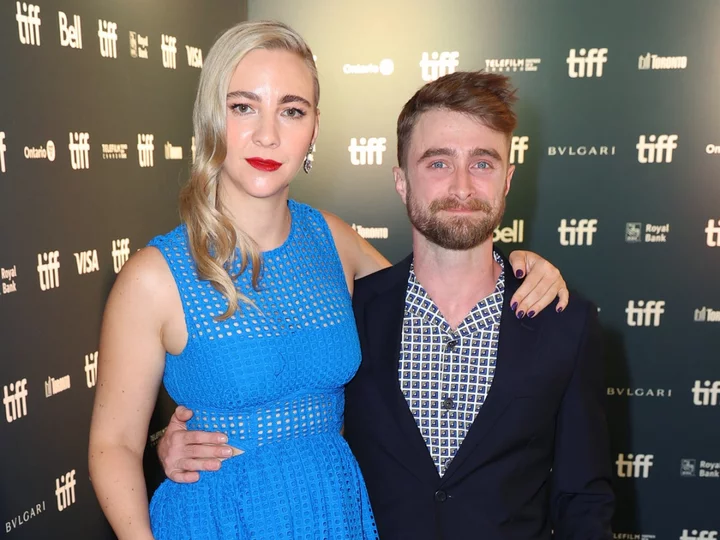
Daniel Radcliffe says seeing girlfriend Erin Darke become a mother is ‘most incredible thing’
Daniel Radcliffe has spoken out about the joys of raising his son with his longtime girlfriend, Erin Darke. Radcliffe, 33, opened up about becoming a father during a recent interview withE! News. His comments came days after he spoke about parenting for the first time, with the actor confirming that he welcomed a “little boy” with Darke in April. Speaking to E! News, the Harry Potter star noted that while he’s enjoyed his time with his son so far, he’s also loved seeing his partner become a parent. “It’s a crazy thing, but it’s also really beautiful, watching my girlfriend become a mum,” he said. [It’s] really the most incredible, beautiful thing to be witness to. So, it’s great.” He poked fun at how grown-up his son is, as he joked that the baby is “fully talking at three-months-old”, and is “very advanced”. The actor then clarified that his child has reached a different milestone, adding: “He’s smiling and that’s all I need. That’s awesome. Some people have to wait a lot longer for that so I’m really happy with that.” During an interview withEntertainment Tonight on 3 July, Radcliffe first revealed that he and Darke were parents to a son, who they welcomed earlier this year. He also acknowledged that he’s been taking some time off from work to focus on his family “It’s great. It’s crazy and intense,” he said about becoming a first time dad. But he’s wonderful and Erin is amazing - it’s a real privilege also to have this time with him. I was always going to take some time off, which not everyone is able to do, and so I’m able to kind of just be here with him a lot, which is lovely.” The Kill Your Darlings star noted that as his child gets older, he will probably be more considerate about how many acting projects he takes on. “It hasn’t really yet affected things, but I really like spending time with him, and I think I’m gonna miss him when I go back to work later in the year,” he said. “So, I will definitely be I think a bit more selective - not more selective, I’ve always been selective, but I think I’ll probably work a little bit less for the next few years.” However, according to Radcliffe, he doesn’t plan to leave acting anytime soon. “I’ll never be stopping. I don’t think that’s good for me either,” he added. In an interview with Newsweek, Radcliffe also opened up about starting a family while working in Hollywood. More specifically, he explained how his own experience with childhood stardom will influence how he parents his children one day. “I want my kids, if and when they exist... I would love them to be around film sets,” he said. “A dream would be for them to come onto a film set and be like ‘God, you know, I’d love to be in the art department. I’d love to be something in the crew.’ Some part of this, but not from that.” The Weird: The Al Yankovic Story star added that even though he enjoys acting himself, he “wouldn’t want fame for [his] kid”. “I think if you can get a situation where you’re on film sets without necessarily [thinking] oh, this is gonna be a big deal in your life, that’s great,” he said. “Film sets are wonderful places. I think a lot of the time it can be wonderful for kids. But it’s really the fame side of it that should be avoided at all costs.” While he recently opened up about fatherhood, Radcliffe has not yet revealed what the name of his new baby is. This doesn’t necessarily come as a surprise, since he and Darke, who’ve been dating since 2012, kept the news of their pregnancy relatively private. Read More Daniel Radcliffe gives frank answer to possibility of joining Harry Potter series Daniel Radcliffe opens up about fatherhood for the first time Daniel Radcliffe shares feelings about new actor playing Harry Potter Daniel Radcliffe opens up about fatherhood for the first time Fiona Phillips target of telephone scam following Alzheimer’s diagnosis Disability Pride Month: Motor neurone disease diagnosis spurred us on to get married
2023-07-07 01:23
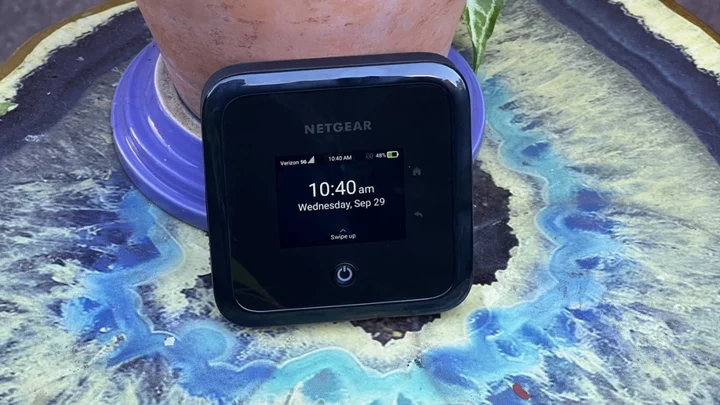
The Best Mobile Hotspots for 2023
Most modern smartphones have a hotspot mode, but cellular modems and Wi-Fi hotspots have historically
2023-07-06 22:27
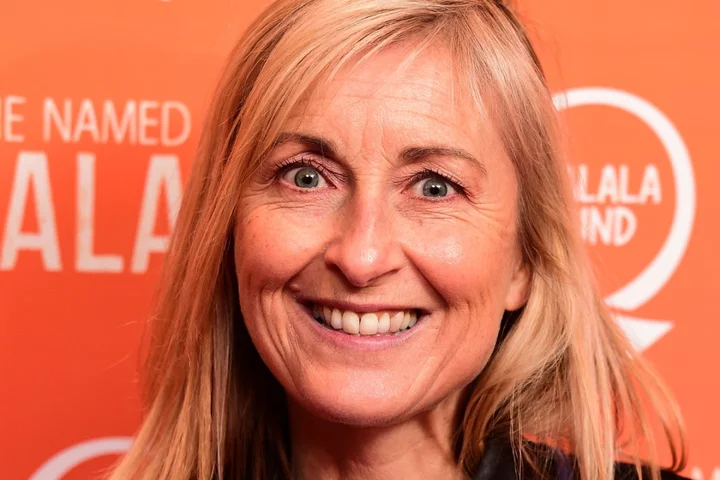
Fiona Phillips target of telephone scam following Alzheimer’s diagnosis
Fiona Phillips found herself to be the victim of a telephone scam following her Alzheimer’s diagnosis. The former breakfast TV presenter, 62, was told she had the condition 18 months ago after she experienced symptoms of anxiety and brain fog, and has since disclosed her diagnosis to the public. Phillips, who is currently taking part in a drug trial that scientists hope could revolutionise the treatment of the incurable illness, has spoken out about an experience where she was scammed over the phone. In a new interview with The Mirror, Phillips explained she was scammed by a person who called her and managed to take money out of her bank account. The publication reports that Phillips was scammed out of “thousands” of pounds but was refunded by her bank. The journalist, best known for presenting the ITV breakfast programme GMTV, told The Mirror that she was reluctant to tell her two sons, Nat, 24, and Mackenzie, 21 – who she shares with her husband, This Morning boss Martin Frizell – about her condition. “I just didn’t want to make a big thing out of it where we all sit down as a family and announce we’ve got something to tell them,” she said. “And I was worried they might be embarrassed in front of their friends or treat me in a different way. And it’s not like I’m doing anything out of character.” Symptoms of Alzheimer’s include memory problems, like forgetting about recent conversations or events or becoming increasingly disorganised. Others include language problems, changes in mood or spatial awareness. It is typical that family members, friends and work colleagues may notice these changes first, often before the person themselves. Phillips, who took part in BBC’s Strictly Come Dancing in 2005, shared that she and Frizell had blood tests to check whether their children could inherit the disease. “We wanted to know in case we needed to prepare the boys to make some difficult decisions later in life,” Frizell told the publication. “When the results came back as negative, it was a huge moment – such an enormous sense of relief. There’s no Alzheimer’s on my side of the family and thank goodness it seems the boys have not inherited from Fiona’s side of the family.” Read More Woman exits plane after tirade about passenger who is ‘not real’: ‘Final Destination vibes’ The Barbie press tour has finally rescued Margot Robbie’s red carpet reputation Fans mistake Jennifer Garner and Ben Affleck’s daughter Violet, 17, for her mother in new photos This is the lesser-known symptom of Alzheimer’s that could affect drivers The shared symptoms of menopause and young onset dementia Fiona Phillips Alzheimer’s diagnosis at 62: 7 ways to reduce your risk
2023-07-06 21:22
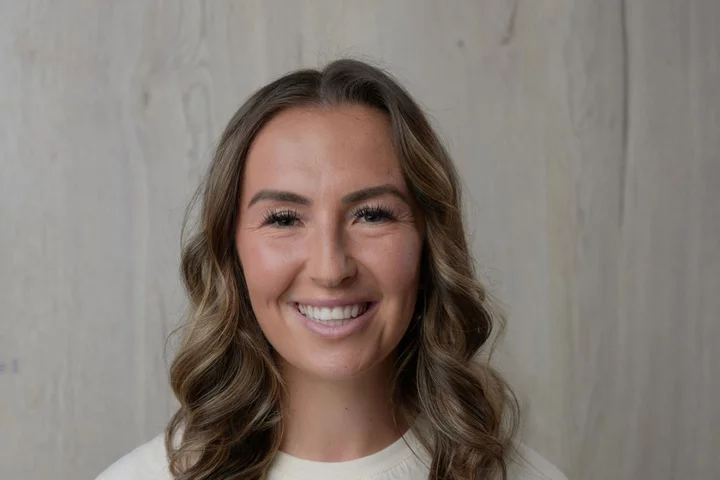
Lioness Katie Zelem: Nerves are good – it’s just about channelling them the right way
Manchester United star Katie Zelem wants one thing if England win the World Cup: Oreo milkshakes. “After games, I like to have an Oreo milkshake. That’s my go-to thing – so simple and easy, but I just love it. So, if we win, I will have a lot of Oreo milkshakes,” Zelem, 27, says with a laugh. But if Oreo milkshakes are Zelem’s top priority after she’s played, what fuels her before a match? “Before games, I’ll always eat pasta. I lived in Italy for a year, so pasta is one of my favourite things and [living in Italy] really gave me inspiration for different types, rather than just the basic stuff.” Training for a major tournament is no small feat, and combined with nutrition, camp before the tournament will be intense.“Obviously, people are all at different stages of [fitness]; some finished the league a bit earlier, and some played more minutes than others, so it’s about getting on the same page, and then ramping it up. It’ll be running, training, gym, everything you can think of.” Facing disappointment when she was not selected for the Euros team, the fresh Lioness has worked hard to get the call-up.“Last year, with the Euros, it didn’t quite go to plan, so I’m so proud of the season I’ve had. We’ve got our rewards by being selected to represent England at a World Cup,” Manchester-born Zelem divulges. “My first major tournament and I’m so excited.” But waiting for the news as to whether she would be heading to Australia and New Zealand, where the Women’s World Cup is taking place this summer, was nerve-wracking. Zelem didn’t want to miss her shot again. “I was actually at home, waiting,” she says. We knew we were going to get a FaceTime call, so it was an anxious morning for everyone.” Heading to her first World Cup, there are bound to be some nerves. “It is a good thing to feel nervous. You’re out. You’re at a World Cup. It should be a little bit nerve-wracking, playing with and against the best players in the world. Nerves are good. It’s just about channelling them in the right way,” Zelem adds calmly. Zelem is looking forward to being reunited with legendary Lioness, fellow midfielder and Barcelona player, Keira Walsh. “I do love joining up with the girls and playing with everyone, but Keira Walsh is a really good friend of mine and I have known her for about 15 years. We played together at the youth age groups a lot, we have done a lot of training camps in England,” the footballer explains. “She moved, and went from being on the doorstep to a totally different country. So, there’ll be a nice reunion at our first major tournament together.” Of course, there will be some noticeable players missing in Beth Mead and Leah Williamson, as ACL injuries have ravaged teams all over the world this season. “One or two is unlucky, but I think so many is just crazy. It certainly needs to be looked at – whether it’s our training load or the changes in play in minutes. As you see the women’s game rise and grow, the expectations become to play more games and have less recovery,” Zelem notes. It means the Lionesses of the Euros have had a shake-up. The new squad is missing its captain and top scorer, but Zelem and the rest of the team are still dreaming of World Cup victory. Katie Zelem, England Lioness and Manchester United Captain, is the brand ambassador for the healthy recipe box service Green Chef which is all about healthy living, your way.
2023-07-06 17:23

This is the lesser-known symptom of Alzheimer’s that could affect drivers
As revealed by TV presenter Fiona Phillips this week, anxiety and brain fog could be symptoms of Alzheimer’s disease – but people are being warned of another lesser-known symptom that could affect drivers the most. It comes after the former breakfast TV host, 62, spoke publicly for the first time about her Alzheimer’s disease diagnosis, which she received 18 months ago. Phillips, who is currently taking part in a drug trial that is hoped could revolutionise treatment for the illness, said she wishes to end the stigma surrounding Alzheimer’s. According to the Alzheimer’s Association, one of the symptoms that could be related to the onset of the disease is trouble understanding visual images and spatial relationships. It said: “For some people, having vision problems is a sign of Alzheimer’s. This may lead to difficulty with balance or trouble reading. “They may also have problems judging distance and determining colour or contrast, causing issues with driving.” This is not the same as having vision problems or changes related to cataracts, which is a typical age-related change. Other early signs and symptoms highlighted by the organisation include memory loss that disrupts everyday activities, such as forgetting information that one only recently learned; experiencing challenges in planning or solving problems; having difficulty taking tasks that are usually familiar; and losing track of dates, seasons or the passage of time. People living with Alzheimer’s may also develop new problems with words in speaking or writing, and may have trouble following or joining a conversation. Misplacing objects and losing the ability to go over their steps to find something is also a common sign of early disease, as is poorer judgement and withdrawal from work or social activities. Phillips said she began to realise something was wrong when she developed “crippling anxiety” towards the end of 2021 and initially thought it was related to menopause. She was put on HRT to treat menopause symptoms, which led to some improvement, however, Phillips’ “brain fog remained”, her husband Martin Frizell said. After months of cognitive tests and a lumbar puncture to asses spinal fluid, Phillips was diagnosed with Alzheimer’s disease. She told The Mirror: “This disease has ravaged my family and now it has come for me. And all over the country there are people of all different ages whose lives are being affected by it – it’s heartbreaking. “I just hope I can help find a cure which might make things better for others in the future.” She is taking part in a medical trial at University College Hospital (UCH) for a drug called Miridesap, which is administered three times a day with tiny needles. Scientists hope the drug can slow or even reverse the disease. Phillips added: “There is still an issue with this disease that the public thinks of old people, bending over a stick, talking to themselves. “But I’m still here, getting out and about, meeting friends for coffee, going for dinner with Martin and walking every day.” In 2022, dementia and Alzheimer’s were named by the Office for National Statistics as the leading cause of death in the UK. Last year, they accounted for 65,967 deaths, up from 61,250 the year before. Read More The Barbie press tour has finally rescued Margot Robbie’s red carpet reputation Woman exits plane after tirade about passenger who is ‘not real’: ‘Final Destination vibes’ Fans mistake Jennifer Garner and Ben Affleck’s daughter Violet, 17, for her mother in new photos
2023-07-06 16:24

Disability Pride Month: Motor neurone disease diagnosis spurred us on to get married
Getting married wasn’t “on the books” for London couple Craig Pollard and Alex Herd for a long time. But that changed when Alex got diagnosed with motor neurone disease (MND) in 2021, aged 30. “We decided to get married as a bit of a consequence of Alex’s diagnosis,” explains Pollard, 35. “It wasn’t something that was on the books for us before, especially as being gay, marriage wasn’t available to us when we were younger, so wasn’t necessarily something we’d aspired to. “But then thinking about the legacy we wanted and how much time we had together, we saw it as a good way of bringing our families together and celebrating something really positive in our life.” MND affects nerves in the brain and spinal cord which send signals to muscles. There is currently no cure, so as muscle loss gets worse over time – affecting movement, speech, swallowing and breathing – it eventually leads to death. It’s uncommon and mostly affects people in their 60s and 70s, although as Herd’s diagnosis shows, MND can occur in younger adults too. The charity Challenging MND, which helps people with MND, has the ‘opportunity to create amazing memories’, funded the couple’s big day last year – a fabulous festival-inspired party officiated by drag queen Just May from RuPaul’s Drag Race UK Season 4. They had already been together for a decade, so the wedding was a “celebration of all the things we’ve enjoyed together over the last 10 years”, Pollard notes (plus “lots of glitter and sparkle – it was perfect”). It was also the last time Herd went a full day without using a wheelchair. “So it was the very last moment we possibly could have done that,” adds Herd, now 32. “And we can look back at that as a really special day.” He first started noticing symptoms in early 2021 – muscle twitching then weakness in his hands and arms, before his legs became increasingly affected. Herd used a manual wheelchair for a while but recently switched to an electric one. “That’s changed my life quite a lot,” says Herd. “While I was in the manual wheelchair and Craig was pushing around, I sort of felt like I didn’t really exist anymore, because everyone would interact with him, and I wasn’t responsible for where I was. But now I’m in control of my movement, I feel like I’m more interacting with people myself.” The diagnosis has been challenging on multiple levels, individually and as a couple. MND doesn’t present with exactly the same patterns for everyone – so there is no guidebook as such, and navigating support services relies on a lot of self-advocating. Things such as specialist physiotherapy and occupational therapy can be helpful, along with home adaptations. “Having MND, you have to get used to things changing,” says Herd. “I mean, I can’t necessarily relate at this point to someone who’s been in their wheelchair for their whole life, but because things keep changing, you can’t really get used to it properly. So it’s very difficult for me to kind of keep hold of my identity.” In a recent survey, Challenging MND found 63% of people living with the MND had felt marginalised or ‘othered’ because of their condition, while 51% felt others see MND as their identity. In addition, 80% said they felt isolated, and 69% worry about being a burden to their family. Feeling ‘othered’ is something Alex found himself thinking about while attending Pride London recently. “It’s almost more like something I’m doing, than something other people are doing – because I’m seeing people doing what I would’ve been doing a year ago, it’s still fairly fresh for me, so I’m still comparing the before and after,” he reflects. “At Pride, lots of people get to see themselves represented in the crowds, and that’s nice. But then I realised how much more of a minority people in wheelchairs are. It made us realise how different our situation is now, our priorities and expectations in general.” Music has been an important way for him to stay connected with his identity. “I’ve been making music for over 10 years, so it’s nice I’m still able to do that. I think as much as possible, people in a situation like this need to try and keep doing the things that made them happy before,” he says. While he can no longer play his guitar, Herd made voice recordings to use an instrument and creates tracks on his computer, using foot pedals as he can no longer click the mouse. Since his diagnosis, he’s actually been finishing a lot more songs. “I have less distractions now!” Herd quips. “But using music as a communication tool, that’s definitely become more important to me.” Challenging MND also supported the couple with a trip to Eurovision – “which was really touching and we made great memories”, says Pollard. They’re also grateful to support from the Motor Neurone Disease Association, who provides a local area liaison, and their local St Christopher’s Hospice has been “really helpful”. These things make a huge difference. “Something I’m very conscious of as an able-bodied person is watching Alex have to come to terms with first of all being disabled, then being visibly disabled, and then being disabled in public – there’s been a lot of different elements we’ve had to really tackle,” Pollard reflects, citing navigating public transport as one of the main everyday challenges. There’s an emotional toll too. “My energy levels are a lot lower than they used to be, and my capacity for stress. I feel like I already have this much higher baseline of anxiety about various things, so it feels much easier to become overwhelmed,” says Herd. “I think the only thing we can really do is just try and focus on the next thing, rather than worrying about everything.” As members of the LGBTQ+ community, there are sometimes other nuances to their experiences. They’ve noticed LGBTQ+ events are doing well with accessibility, but representation can be a more subtle matter. “There’s definitely an element of the community who are very mindful of others and very empathetic, which I think has been where I’ve learned a lot about different people’s experiences in my life,” says Pollard. “But when it comes to the overall society of the community, I think there’s still a large proportion of it based on image, based around being cool and trendy. So it’s quite easy for people with accessible requirements to be kind of ignored in that space.” As for their experiences in public, Craig says: “We have struggled to feel like we can take up space. First of all being LGBT, we often don’t feel that safe in certain spaces, public transport we’ve had trouble on once or twice in the past, so you’re always a bit uneasy. With moving into being more visibly disabled and needing more accessible requirements, that’s something we’ve to discuss and manage.” Thanks to Challenging MND, the couple are banking up the joyful times. “They offered to support our wedding, which was really special, and without them we probably wouldn’t have had it,” says Pollard. “That isn’t just a memory for us, it’s a memory for our families and friends too. It was really special.” Challenging MND aims to support and empower those living with MND to create lasting memories for themselves and their families. To date they’ve granted in excess of £1.1million and supported over 100 families.
2023-07-06 16:22
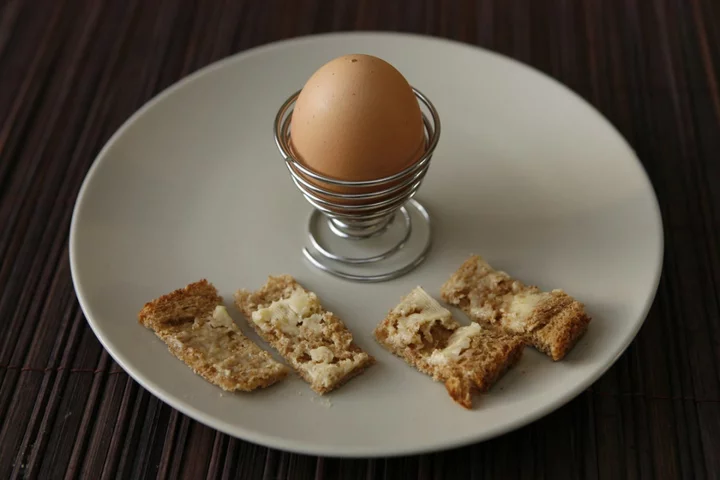
One in four adults in UK have never boiled an egg, survey reveals
More than a quarter of UK adults have never boiled an egg and do not know how to, fewer than a fifth have made a salad dressing and just 45 per cent have baked a Victoria sponge cake, according to a report by Waitrose. While more than a third of people (35 per cent) rate themselves as ‘very good’ or ‘excellent cooks’, some 27 per cent have never boiled an egg, a survey for the supermarket’s annual Cooking Report found. Nearly two-fifths (39 per cent) wish they could spend more time in the kitchen than they actually do, while one-fifth (20 per cent) say they are entertaining more at home due to the cost-of-living crisis – although 34 per cent now think the term ‘dinner party’ is old fashioned. Four in 10 (40 per cent) are happy to choose cheaper cuts of meat and more affordable ingredients to economise when entertaining and seven per cent will ask friends to bring a dish or course. Meanwhile, despite the soaring popularity of air fryers, microwaves have topped a list of 24 kitchen gadgets that most adults said they could not live without. Almost three times as many people said they could not live without their microwave as those who said the same about air fryers, at 32 per cent and 12 per cent respectively. Waitrose said searches for ‘microwave meals’ were up 71 per cent on waitrose.com compared with the same time last year, while sales of microwaves were up 13 per cent at John Lewis. Martyn Lee, executive chef for Waitrose, said: “Food is a daily joy and the cost-of-living crisis has hastened a change in how we cook. “For too long we’ve been looking down on microwaves. You can do so much more in them than heat a cup of coffee. I make a great sponge in mine. I think it’s time to remember the enjoyment we get from the anticipation of their pinging. “When you reheat a stew, or a slice of lasagne in your microwave after the flavours have had time to develop, you enjoy what’s known as the sixth taste sensation ‘kokumi’ – which is lesser known than the other five tastes – sweet, salty, sour, bitter and umami.” The survey also found 46 per cent of people ignore the sell-by dates on packaging, 38 per cent use the ‘five-second rule’ for picking up food that has dropped on the floor, and 16 per cent are happy to scrape mould off food to eat or cook with it. One-third get their ideas on what to cook from TV programmes and five per cent have turned to Chat GPT for recipe inspiration. OnePoll surveyed 4,000 UK adults between 10-16 May and 24-30 May. Read More The dish that defines me: Eddie Huang’s Taiwanese beef noodle soup Woman exits plane after tirade about passenger who is ‘not real’: ‘Final Destination vibes’ Fans mistake Jennifer Garner and Ben Affleck’s daughter Violet, 17, for her mother in new photos Charity boss speaks out over ‘traumatic’ encounter with royal aide Ukraine war’s heaviest fight rages in east - follow live
2023-07-06 15:28
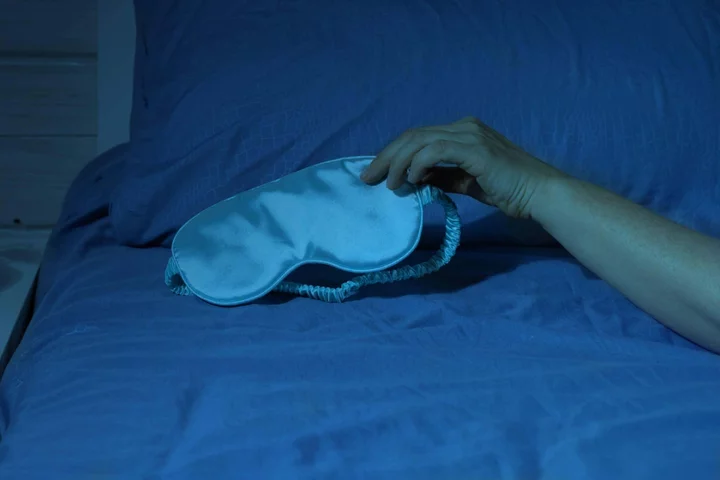
Middle-aged people who skip on sleep won’t see cognitive benefits of exercise
Middle-aged people not getting enough sleep are less likely to see the benefits of exercise when comes to protecting against decline in skills such as memory and thinking, scientists have said. Researchers from University College London (UCL) found that those in their 50s and 60s who performed regular physical activities but slept less than six hours a night had a faster decline in these skills overall. The team found that after a decade, their cognitive functions – such as attention, memory and learning – were the same as those who did less physical activity. The researchers said their study, published in journal The Lancet Healthy Longevity, highlights the need for sleep to protect against cognitive decline as people get older. Lead author Dr Mikaela Bloomberg, of UCL Institute of Epidemiology & Health Care, said: “Our study suggests that getting sufficient sleep may be required for us to get the full cognitive benefits of physical activity. “It shows how important it is to consider sleep and physical activity together when thinking about cognitive health. “Previous studies examining how sleep and physical activity might combine to affect cognitive function have primarily been cross-sectional – only focusing on a snapshot in time – and we were surprised that regular physical activity may not always be sufficient to counter the long-term effects of lack of sleep on cognitive health.” The World Health Organisation already identifies physical activity as a way to maintain cognitive function, but interventions should also consider sleep habits to maximise long-term benefits for cognitive health Prof Andrew Steptoe For the study, the team looked at data from the English Longitudinal Study of Ageing (Elsa) from nearly 9,000 people aged 50 and over. Their cognitive function was assessed over a period of 10 years with various memory and verbal fluency tests. Questionnaires were also used to assess how long they slept and whether this was less or more than six hours. People were also asked about their levels of physical activity. At the start of the study, those who were more physically active also had better cognitive function regardless of how long they slept. However, this changed over the 10-year period, with more physically active short sleepers in their 50s and 60s experiencing more rapid cognitive decline, the researchers said. But for people aged 70 and over, the benefits of exercise on cognitive function were maintained, despite short sleep, the team added. Co-author professor Andrew Steptoe, of UCL Institute of Epidemiology & Health Care, said: “It is important to identify the factors that can protect cognitive function in middle and later life as they can serve to prolong our cognitively healthy years and, for some people, delay a dementia diagnosis. “The World Health Organisation already identifies physical activity as a way to maintain cognitive function, but interventions should also consider sleep habits to maximise long-term benefits for cognitive health.” Read More 8 best kids’ bunk beds that are fun and functional Nurture your health and wellbeing this season The best holidays to book for August, from beach breaks in Portugal to stays on an Italian lake More travelers get cozy with glamping, even amid high costs People who sleep very late may die earlier due to unhealthy habits, study says
2023-07-06 13:28
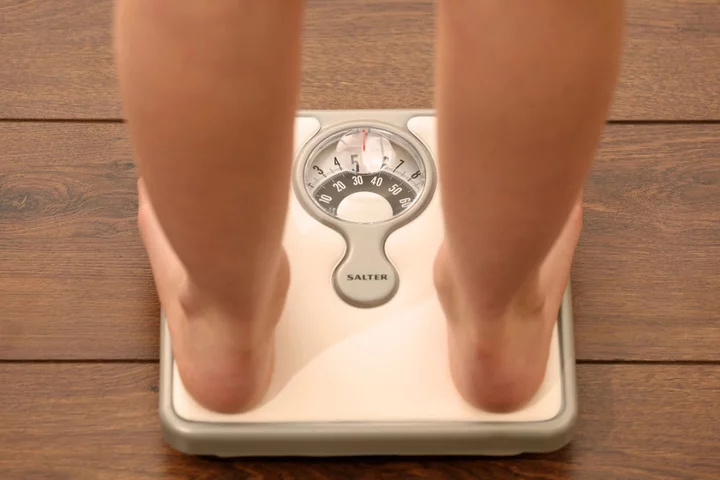
Being overweight ‘linked to 18 cancers’ in under-40s
Being overweight as a young adult can increase the risk of developing 18 cancers – more than have been previously linked with the disease, researchers found. Previous studies have shown that people who are overweight or obese have a heightened risk of a number of different cancers including breast, bowel, kidney and pancreatic. Now excess weight has also been linked to leukaemia, non-Hodgkin lymphoma, and among never-smokers, bladder and head and neck cancers in a large new study. The authors said these cancers have not previously been “considered as obesity-related cancers”. Our findings support public health strategies for cancer prevention focusing on preventing and reducing early overweight and obesity Study authors And that the impact of obesity on cancer is “likely underestimated”. The new study, published in Nature Communications, saw researchers examine data on more than 2.6 million Spanish adults aged 40 and under who were cancer-free in 2009. Researchers examined the body mass index (BMI) scores throughout the lifetime of people involved with the study, saying that previous research investigating the link between weight and cancer has used single BMI scores. The people in the study were tracked for nine years to see whether they developed cancer. Some 225,396 were diagnosed with cancer during the period studied. The Spanish researchers found that those who were overweight or obese in early adulthood – aged 40 and under – appeared to have an increased risk of cancer. Those who were overweight or obese for a longer period also appeared to have a higher risk. Our own evidence shows that maintaining a healthy weight throughout life is one of the most important things people can do to reduce their cancer risk, and early prevention in adulthood is key Dr Heinz Freisling, one of the study’s co-leaders Overall, some 18 cancers were linked to excess weight. The authors wrote: “This study shows that longer duration, greater degree, and younger age of onset of overweight and obesity during early adulthood are positively associated with risk of 18 cancers, including leukaemia, non-Hodgkin lymphoma, and among never-smokers, head and neck, and bladder cancers which are not yet considered as obesity-related cancers in the literature. “Our findings seem to indicate that longer exposures to overweight and obesity (with or without accounting for the degree of overweight and obesity), as well as developing overweight and obesity at younger ages in early adulthood might increase cancer risk. “Our findings support public health strategies for cancer prevention focusing on preventing and reducing early overweight and obesity.” Dr Heinz Freisling, from the International Agency for Research on Cancer and one of the study’s co-leaders, said: “The results of our study support a re-evaluation of the cancer burden associated with overweight and obesity, which currently is likely underestimated.” Commenting on the study, Dr Panagiota Mitrou, director of research, policy and innovation at World Cancer Research Fund, said: “This large study has future public health implications since additional cancers, such as leukaemia and non-Hodgkin lymphoma, have been shown to be linked with overweight and obesity. “Our own evidence shows that maintaining a healthy weight throughout life is one of the most important things people can do to reduce their cancer risk, and early prevention in adulthood is key.” Read More Study says drinking water from nearly half of US faucets contains potentially harmful chemicals Up to 10,000 Britons could take part in cancer vaccine trials People with signs of bowel cancer should be offered a £5 ‘poo test’ before invasive bowel investigations Nurture your health and wellbeing this season What diet drinks don’t have aspartame in them?
2023-07-06 13:21
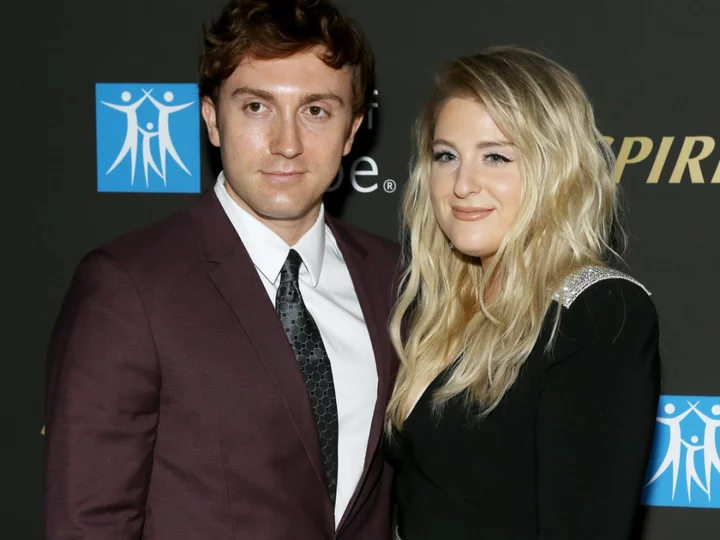
Meghan Trainor and husband Daryl Sabara welcome second child with unique name
Meghan Trainor and her husband Daryl Sabara have welcomed their second child, a son named Barry Bruce. Trainor, 29, and Sabara, 31, shared a joint post on Instagram on Tuesday to announce the baby news. In addition to their newborn, the pair are also parents to a two-year-old son, Riley. In the caption, Trainor revealed when the baby was born and formally introduced him. “On July 1st (our seven-year anniversary of our first date) we welcomed Barry Bruce Trainor into the world,” she wrote. She went on to share that she welcomed the infant via Caesarean section before thanking her medical team for their support. “He was a big boy at 8lbs 7oz...and sideways (transverse), but we had an amazing, successful C-section, and I finally got my skin to skin time!” the “Mother” singer wrote. “Thank you to all of the incredible doctors and nurses who took such great care of us.” The Instagram post included multiple photos of the newborn with his mother and father, along with snaps of the singer in a hospital bed. In the comments, fans and celebrities celebrated the baby news, with Paris Hilton writing: “Congratulations sis! So happy for you!” “Go Mama!! And welcome to the party, Barry!! What a lucky dude!” Mandy Moore added, while Gina Rodriguez wrote: “He is perfect!!! Congrats sweet superhero mama!!!” In January, Trainor revealed that she was pregnant with her second child when she confirmed the news in an interview with People. At the time, she said she was “ just so grateful [that she could] get pregnant”. “I’m crushing it. This is amazing,” she said in a statement to the magazine at the time. “This is my dream. I’m halfway there - I want four kids!” She went on to reflect on how her second pregnancy was different from her first. “It’s like a real pregnancy,” she said. “The first one was like make-believe. I had no symptoms with Riley to the point where I was like: ‘We need to go to the doctor. There’s nothing in me.’” Since then, Trainor has also opened up about how her first experience with childbirth impacted her mental health. In April, she revealed that she struggled with post traumatic stress disorder (PTSD) after welcoming Riley via Caesarean section. During an interview with Today, she said that after she’d had her child and returned from the hospital, there were times she felt like she was still in the delivery room. “I was like: ‘It’s so weird,’ to my therapist and my doctors,” the “Made You Look” singer recalled. “I was like: ‘It’s like I’m back in my room.’ At nighttime, when the pain would kick in. I was like: ‘Daryl, I’m still on the table, I know she’s inside me.’” Trainor said that the feeling, which went on for “months,” ultimately led to her diagnosis. “They were like: ‘So we have to work through this. That’s a sign of PTSD,’” she recalled. “And I was like: ‘Oh, I didn’t know that.’” PTSD is “a mental health condition that’s triggered by a terrifying event through either experiencing it or witnessing,” as noted by the Mayo Clinic. According to the Postpartum Support International, approximately “nine per cent of women” experience PTSD after childbirth Read More Meghan Trainor reveals the symptom that led to her postpartum PTSD diagnosis Meghan Trainor’s ‘big boy’ sex story with her husband is not what you think Meghan Trainor apologises for ‘careless’ teacher remark: ‘I’m so so sorry’ How to go sober if your partner still drinks The shared symptoms of menopause and young onset dementia Fiona Phillips Alzheimer’s diagnosis at 62: 7 ways to reduce your risk
2023-07-05 23:27
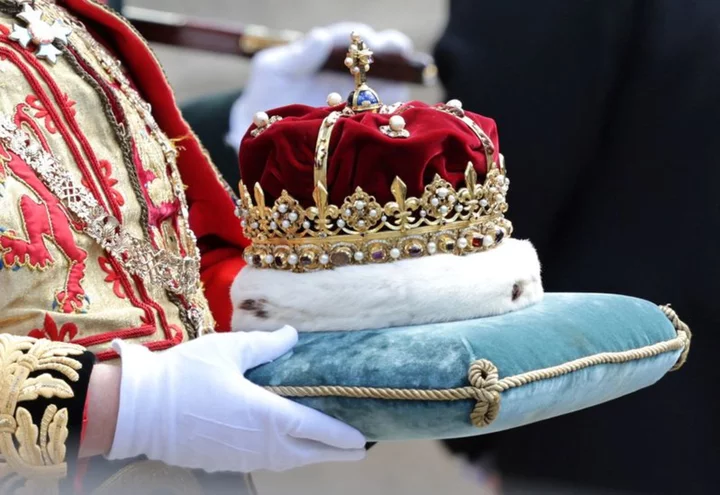
Scotland marks coronation of King Charles and Queen Camilla
By Phil Noble EDINBURGH (Reuters) -Scotland marks the coronation of King Charles and his wife Camilla on Wednesday with a
2023-07-05 21:15

How to go sober if your partner still drinks
Jennifer Lopez has come under fire for launching and promoting her new alcohol brand, due to her husband Ben Affleck’s problems with alcoholism. The 53-year-old Let’s Get Loud singer, who had previously told InStyle that she abstains from caffeine and alcohol, took to Instagram following the announcement of her new liquor brand Delola, saying she enjoyed the “occasional cocktail” but did not drink to excess. Fans had been quick to criticise her, posting comments like, ‘Why not respect your husband’s sobriety?’ Her husband Ben Affleck, 50, has been candid about his struggles with alcoholism. In a 2020 New York Times interview, he shared: “It took me a long time to fundamentally, deeply, without a hint of doubt, admit to myself that I am an alcoholic… The next drink will not be different.” Affleck is sober, but seemingly, Lopez is not. “Going sober can be really difficult, especially if your partner drinks. There may be aspects of your drinking which they enjoy, so it’s quite common for people close to you, to say things which make it harder to go sober,” says Dr David McLaughlan, a visiting consultant psychiatrist for the Priory. So, how can you do it if your partner isn’t so keen? Consider what you will gain “Going sober might mean less drunken fallouts or arguments about incidents which occurred under the influence of alcohol. Avoiding hangovers also gives you back a lot more quality time together and more free cash to spend on things that matter to you,” says McLaughlan. If more sex and higher fertility are important to you, quitting the booze may help, perhaps helping to garner support from your partner too. “You might also notice increased libido and erectile function when you quit drinking. Even small amounts of alcohol reduce your fertility, so giving up will also increase your chances of falling pregnant together,” he explains. Find the right time to discuss it It may be a sensitive topic to dive into. “It is important when you go sober, that you find a time when your partner is calm, collected and willing to discuss a big change in your relationship,” says Phil Jackman, an addiction therapist at private rehab clinic Delamere. “Attempting to speak to them when they are stressed or busy may lead to unnecessary conflict. “Once you’ve found the right time, be honest with your partner and let them know the reasons you are giving up alcohol, and how this might impact your relationship. Hopefully, they will be supportive of your decision, but there might need to be a few things you need to work through first. “If you are with a partner that still likes a drink, try asking them if they can remove any alcohol from the house, or from a place you have access to it, so you aren’t tempted to give up on your sobriety,” he says. Don’t make unfair demands of them “Though it is fair to ask your partner to stop drinking and support you in sobriety, it is important that this is not a strict expectation of them. Assuming someone will automatically change their lifestyle just to suit yours may cause unnecessary conflict,” Jackman says. “Instead, when you make the decision to go sober, it’s important that you sit and talk through the reasons why you want to give up drinking, so they fully understand your decision. You may find they want to improve their own personal relationship with alcohol. However, it’s important to note, not everyone will be willing to do so. ” Seek out authenticity One of you quitting drinking could break a dangerous cycle. “If you and your partner regularly drink, more than just socialising with friends or during an occasion, your relationship could develop with a co-dependency to alcohol, where you are drinking to maintain the relationship,” says Dr Stefan Walters, Caba’s addiction specialist. “As humans, we can be highly influenced by peer pressure and the people around us. So, if we are socialising with those who drink heavily, we may feel a judgement for being sober, or that we are not joining in on the fun,” he explains. Pushing past that dependency will help you be authentic with your partner. “When you are sober, your personality is authentic, and you will feel emotionally present throughout conversations and experiences with your partner,” Walters adds. Find new things to do together If one of you does not drink, you may have to think outside the box about things you can do together. “If you are still feeling this way about the activities or hobbies after some time, I’d recommend speaking openly with your partner about adjusting or changing them,” says Walters. “Generally, you may feel that you’d rather take up healthier hobbies, like physical pursuits or mentally stimulating activities, instead of those centred around drinking, like quizzes or socialising at the pub. “So, it’s not necessarily about how to enjoy the same things, but working out how to spend time together through new activities that you both enjoy and receive emotional fulfilment from,” he explains. Going sober could help you find something new you love to do together. Read More Charity boss speaks out over ‘traumatic’ encounter with royal aide Ukraine war’s heaviest fight rages in east - follow live Fiona Phillips Alzheimer’s diagnosis at 62: 7 ways to reduce your risk 7 popular destinations that will soon be in London’s ULEZ Kate’s best Wimbledon looks, as she steps out in retro outfit for the tennis
2023-07-05 20:49
